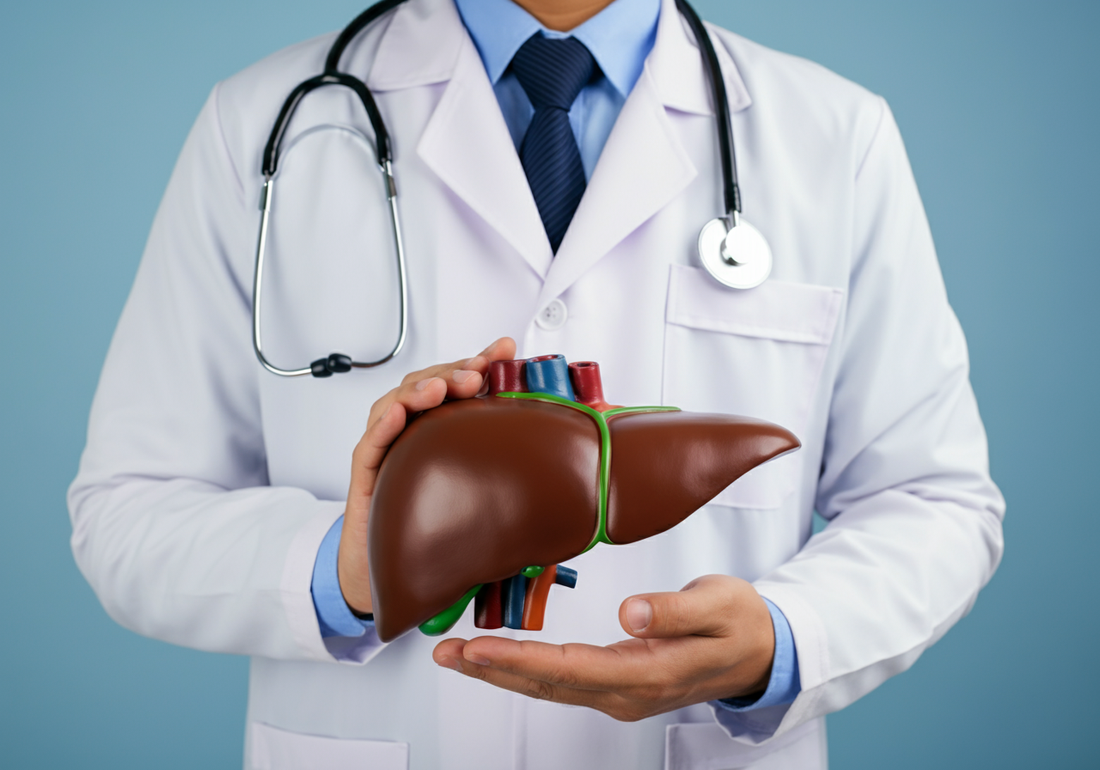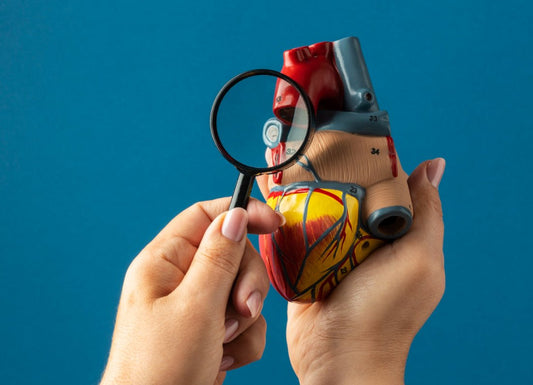What is a liver doctor called?
 Written By
Abel Tamirat, MD
Written By
Abel Tamirat, MD

If you're dealing with liver-related symptoms like fatigue, yellowing of the skin, or discomfort in your upper right abdomen, you might wonder: What is a liver doctor called? The short answer: a hepatologist.
This guide will teach you about the role of a hepatologist, when you should consider seeing one, the conditions they treat, and what you can expect during your visit.
What does a liver doctor specialize in?
A hepatologist is a medical specialist who focuses on your liver, gallbladder, bile ducts, and pancreas. These organs are essential for digestion, hormone balance, and detoxification.
Hepatologists are trained to:
-
Diagnose and treat liver diseases like hepatitis or fatty liver
-
Monitor liver health over time
-
Manage advanced liver conditions like cirrhosis or liver cancer
-
Guide you through lifestyle changes and treatment plans
In many cases, they also work closely with transplant teams if liver failure occurs.
They also coordinate with other specialists, like nephrologists who manage kidney function (see our guide on at-home kidney tests).
Is a hepatologist the same as a gastroenterologist?
Not quite. A gastroenterologist treats the entire digestive system, which includes the stomach, intestines, and more. Some gastroenterologists receive extra training in hepatology, but hepatologists focus only on liver-related conditions.
If you're experiencing specific liver symptoms or have a liver diagnosis, your primary care provider or gastroenterologist might refer you to a hepatologist for more specialized care.
When should you see a liver specialist?
You may want to talk to a hepatologist if you experience:
-
Yellowing of the skin or eyes (jaundice)
-
Constant fatigue or brain fog
-
Pain or swelling in the upper right abdomen
-
Unexplained weight loss
-
Persistent nausea
-
Swelling in your legs or belly
-
Dark urine or pale-colored stools
These symptoms can be signs of liver stress or damage. Early detection can help prevent long-term complications.
What conditions does a hepatologist treat?

Hepatologists diagnose and manage a range of liver-related conditions. Some of the most common include:
Fatty Liver Disease
-
Nonalcoholic fatty liver disease (NAFLD): Linked to insulin resistance, weight gain, and poor diet
-
Alcohol-related liver disease (ALD): Caused by long-term alcohol use
Viral Hepatitis
-
Hepatitis A: Often short-term, spread through contaminated food or water
-
Hepatitis B: Can become chronic and lead to liver damage
-
Hepatitis C: Often silent until significant damage has occurred
Cirrhosis
Advanced scarring of the liver that impairs function. Common in people with long-term fatty liver disease, hepatitis, or alcohol-related damage.
Liver Cancer
Usually occurs in people who already have cirrhosis or chronic hepatitis B or C.
Genetic or autoimmune liver conditions
Such as:
-
Hemochromatosis (iron overload)
-
Wilson’s disease (copper buildup)
-
Autoimmune hepatitis
-
Primary biliary cholangitis (PBC)
-
Primary sclerosing cholangitis (PSC)
What happens during your first visit?
If you're referred to a liver doctor, here’s what you can expect:
Health history
You'll answer questions about your symptoms, medications, lifestyle, and family history.
Physical exam
The doctor may check for swelling, tenderness, or signs of jaundice.
Blood tests
These help measure how well your liver is working. Common tests include:
-
ALT and AST (enzymes)
-
Bilirubin
-
Albumin
-
INR (blood clotting)
Imaging
You might be scheduled for:
-
Ultrasound: To view the liver’s size and texture
-
FibroScan®: A painless scan to measure liver stiffness (fibrosis)
-
CT or MRI: To check for tumors or severe damage
Liver biopsy (if needed)
In certain cases, a small tissue sample may be taken for diagnosis.
How are liver diseases treated?

-
Antivirals for hepatitis B or C
-
Steroids for autoimmune conditions
-
Medications to reduce fat buildup or inflammation
Monitoring
You might need follow-up scans and bloodwork every few months to track your progress.
Procedures
In advanced cases, you might need:
-
Fluid drainage (for ascites)
-
Screening for liver cancer
-
Referral for liver transplant evaluation
How can you support your liver at home?

Here are some daily habits to help keep your liver healthy:
-
Limit alcohol: Too much alcohol over time can damage liver cells
-
Stay at a healthy weight: Extra weight increases your risk for fatty liver
-
Get vaccinated: Protect yourself from hepatitis A and B
-
Use medications carefully: Especially acetaminophen (Tylenol), which can harm the liver in high doses
-
Eat a balanced diet: Focus on whole foods, fiber, and healthy fats
-
Avoid sharing personal items: Like razors or toothbrushes that can spread hepatitis viruses
Is liver disease reversible?
In many cases, yes — especially if caught early. For example:
-
Fatty liver disease can often improve with diet, weight loss, and exercise
-
Hepatitis C can now be cured with antiviral medications
-
Autoimmune conditions may respond well to steroid treatment
-
Liver inflammation may subside if alcohol use is reduced or stopped
However, once scar tissue builds up (cirrhosis), it may not fully reverse. That’s why early action matters.
Takeaway
So, what is a liver doctor called? A hepatologist. But that’s just the beginning.
A hepatologist is a highly trained medical specialist who can diagnose, treat, and help you manage a wide range of liver-related conditions. From hepatitis to liver cancer, these experts play a critical role in preserving your liver function — and, by extension, your overall health.
Whether you’ve been referred to one for abnormal liver test results or you’re experiencing symptoms of liver dysfunction, knowing what a hepatologist does can empower you to take the next step in your health journey.
Your liver may work quietly behind the scenes, but its health is central to your body’s wellbeing. Don’t wait for symptoms to get worse. If you have concerns, ask your doctor if a consultation with a hepatologist is right for you.
Take the next step
Think your liver might need attention? Our at-home liver health test can help you get answers sooner — from the comfort of home.
Related Resources
Looking to learn more about liver health and care? These guides may help:
-
At-Home Liver Tests: A Comprehensive Guide – Discover how at-home tests can help you monitor your liver function easily.
-
Early Detection of Liver Disease – Why early screenings matter and how they improve outcomes.
-
Signs Your Liver Is Healing – Learn the key signs that show your liver is getting healthier.
References
Clinic, C. (2023, October 13). Hepatologist (Liver Doctor): What They Treat & Training. Retrieved September 17, 2025, from Cleveland Clinic website: https://my.clevelandclinic.org/health/articles/hepatologist
Krstić, M. N., Mijač, D., Tomašević, R. S., Lukić, S., Stojković Lalošević, M., Krstić, J. M., & Milosavljević, T. (2021). Abnormal Liver Blood Tests: Hepatologist Approach. Digestive Diseases, 40(2), 206–214. https://doi.org/10.1159/000517110
Liver problems - Doctors and departments - Mayo Clinic. (2025). Retrieved September 17, 2025, from Mayoclinic.org website: https://www.mayoclinic.org/diseases-conditions/liver-problems/doctors-departments/ddc-20374509
Moriarty, C. (2020, February 10). Which Specialist Do I Need? Maybe a Doctor You Didn’t Know Existed. Retrieved September 17, 2025, from Yale Medicine website: https://www.yalemedicine.org/news/which-specialist-do-i-need
Tee-Melegrito, R. A. (2022, July 7). What to know about liver specialists (hepatologists). Retrieved September 17, 2025, from Medicalnewstoday.com website: https://www.medicalnewstoday.com/articles/liver-specialist

Dr. Abel Tamirat is a licensed General Practitioner and ECFMG-certified international medical graduate with over three years of experience supporting U.S.-based telehealth and primary care practices. As a freelance medical writer and Virtual Clinical Support Specialist, he blends frontline clinical expertise with a passion for health technology and evidence-based content. He is also a contributor to Continuing Medical Education (CME) programs.



